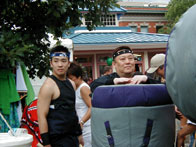
Photo by Naokazu Oinuma: Isaku Kageyama of Amanojaku.
Every parent should have a stage to boast about their child/ren.
I got to do it recently with an AP article for our online service for young readers asap.
It was a special writing/reporting experience, and I learned a lot about my son.
Music is a way of expressing/exploring identity.
For Isaku, taiko is an important way he can feel comfortable about being marginal _ never being quite all Japanese or all American.
It’s all the same in the end.
Art helps us cope with pain.
But it also links with Something larger than life.
Isaku’s bilingual blog
Amanojaku’s DVD of a recent concert went on sale earlier this year. To get yours, contact Isaku at: isaku.kageyama@amanojaku.info
The power of Amanojaku lies in the composing by the group’s founder, leader and creative force Yoichi Watanabe.
Every Watanabe tune is a narrative _ a trickling stream turning into dashing ocean waves, a dirgelike tune that’s a testament of parental love, a samurai flashing his/her sword in determined battle.
Watanabe’s storytelling is effective because taiko is not only dramatic but also based on nuance _ a feeling in reverberations _ and evocative of sounds from nature and other universal associations.
Watanabe also has that genius sensibility in matching rhythm patterns with truly “kakkoii” moves that are so Japanese.
He also juxtaposes Japanese rhythms with standard Latin beats in intelligent ways so it never becomes gimmicky.
I love that moment when the drummers, one by one, tap out a Latin rhythm in a transition section of “Dotou.”
At the end of that segment, when the drummers flick their drumstick against the circular side of their taiko, and then OOOMPH! dive right into a groove, it just feels soooo good, like something jerking your insides probably where your intestines attach to the bottom of your stomach.
You just have to be there.
I’ve been to their concert so many times, but I still wait for that moment.
Amanojaku on YouTube
Taiko is for the Japanese what conga is for Latin culture, djembe is for African music and traps drumming is for American jazz.
What one Brazilian youngster has to say about what taiko means to him:
Bruno Takao Murakami, a 23-year-old third-generation Japanese-Brazilian, who has been studying with Amanojaku for nearly two years, says taiko has helped him feel proud of his Japanese ancestry.
“Isaku sensei is one of the best teachers I’ve ever had,” he says. “I like his spirit and the way he looks at taiko.”


